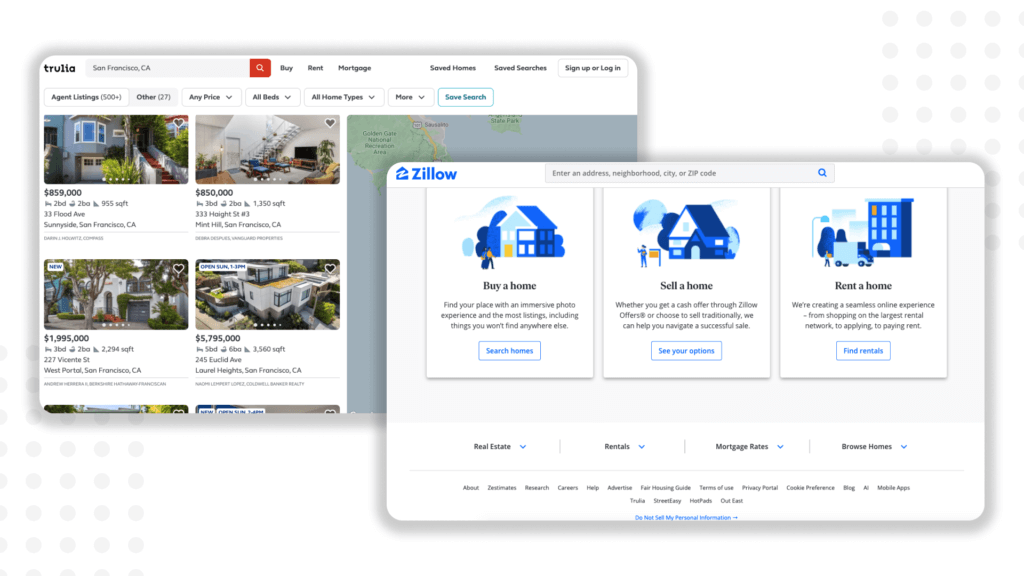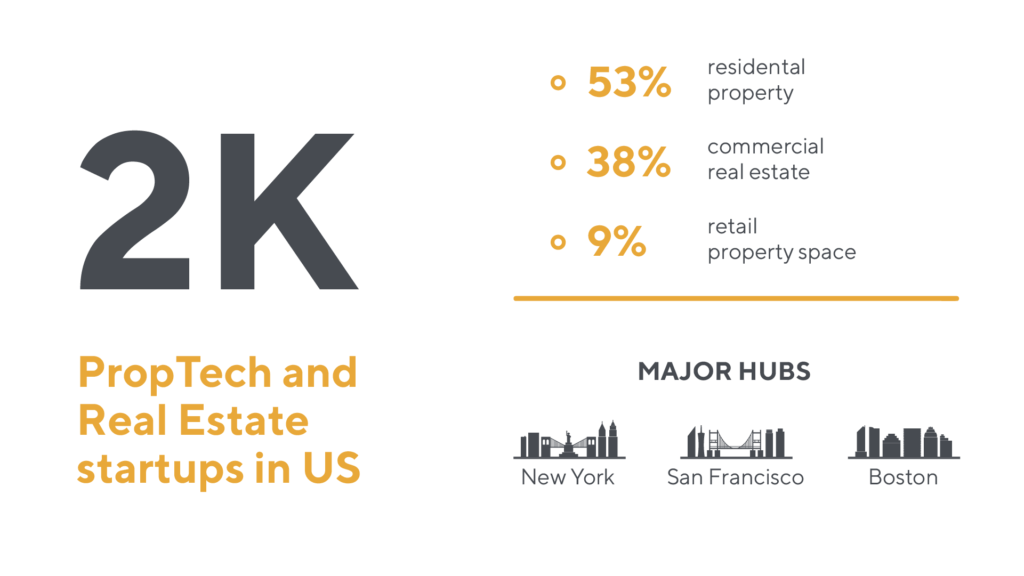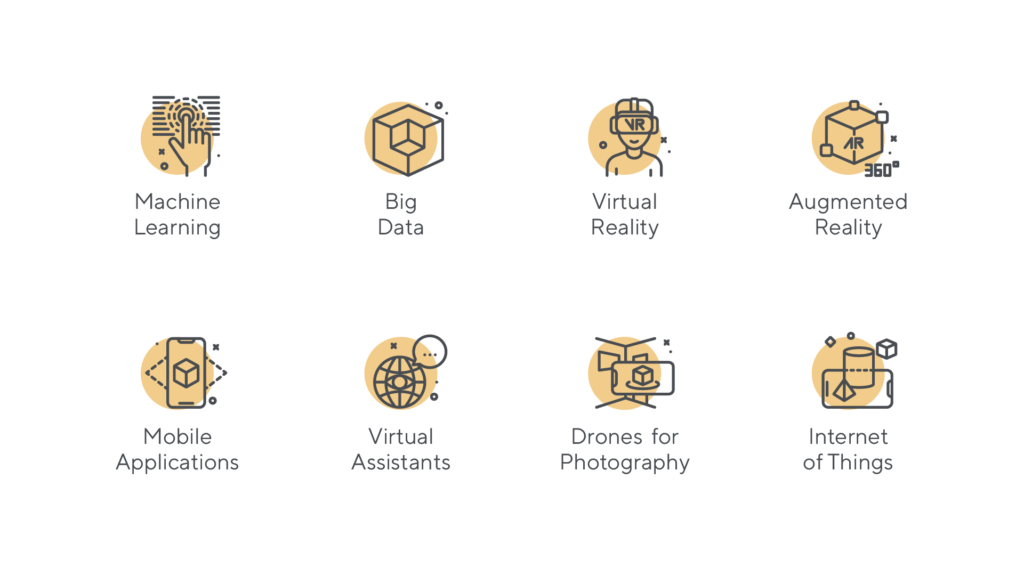As a sector, property and especially property rental marketplaces, is exciting for software developers and entrepreneurs. It’s always going to be a growth area. Money can always be made from property, and one of the most exciting things right now is finding new ways to innovate around existing concepts.
Concepts such as real estate marketplaces, where the market leaders are Zillow and Trulia. In this article, we will take a closer look at those, and consider ways entrepreneurs can innovate in that space and potentially build whole new multi-billion dollar businesses.
What are property rental marketplaces?
Property rental marketplaces, such as Zillow and Trulia (a sub-brand of Zillow, acquired for $2.5 billion in 2015) are market-leaders in this space. There are others of course, including Rightmove in the UK, and many more around the world. Similar, in a way to travel, jobs and restaurant platforms; these are massive, and serve to bring together buyers and sellers.
On property rental marketplaces, the sellers are often real estate companies and realtors, who are listing properties. The buyers, on the other hand, are customers looking to rent (or buy) properties. What sellers need (e.g. the property owners, managers and realtors) need is a series of features that helps them promote properties.
Buyers and those looking to rent, on the other hand, need to get an idea what a property is like. A potential renter needs to know what a property looks like, where it is, how much it costs, the deposit they’ll need to pay, and any other useful pieces of information (e.g. are pets allowed, etc.?).
Perhaps unsurprisingly, given this was an early area for web platforms disrupting traditional ways of buying, selling and renting, it’s considered a mature market. Before these platforms, you’d need to buy newspapers with property listings, and listings special sections, and would need to contact realtors directly to get information on the properties they had available.
Then real estate marketplaces came along, around the time of the Web 2.0 Boom, in the years that followed the Dot Com crash of the early 2000s. Zillow, for example, was founded 15 years ago, is publicly listed, employs over 5,000 people and has a turnover of around $2.7 billion. Rightmove is similar, a UK-based company, founded in 2000, is also publicly listed, and has revenues in the $250 million range.
Next we look at how entrepreneurs can innovate in this space, and how to grow the next big thing in real estate and property tech (PropTech).

Picture 1. Zillow and Trulia marketplaces.
How to innovate in the PropTech sector?
Investors are still pouring tens of billions into this sector. It’s still an area of high-growth, with numerous opportunities for entrepreneurs and startup founders, and even existing startups in this space, to innovate and bring out new products and services.
According to Unissu research, there are around 2,000 PropTech and real estate related startups in the US. 53% are involved in residential property, while 38% focus on commercial real estate and 9% in the retail property space. New York, Boston and San Francisco are major hubs for this sector, whereas London, Paris, Tel Aviv and other global cities are comparable hubs in other countries.
There are numerous areas where growth is possible. Remember, real estate is a sector rich in data, with few tools and solutions for extracting meaningful and actionable insights, for realtors, owners and renters. One area of innovation would be to use AI or ML to extract insights from the major real estate portals, such as Zillow and Trulia, through APIs, to offer new products and services to customers both sides of the table: owners and renters, alongside realtors.
For property owners, especially those with large rental portfolios, artificial intelligence (AI), machine learning (ML) and other big data-driven insights are often welcomed and prove valuable. This is another exciting growth area for real estate technology entrepreneurs, and investors to back them.

Picture 2. US prop tech sector.
Alongside everything connected to Big Data, the global pandemic has changed the way customers engage with property they’re interested in. Before 2020, for most property listings, pictures were enough. However, when in many countries in-person viewings weren’t possible, video viewings (known as virtual tours) quickly became common practice. For those, no new technology was needed. Realtors simply started filming properties on cameras and phones, then uploading these to property portals, such as Zillow and Trulia.
However, some innovative companies, either because they’d already developed technology for other uses, or because they quickly spotted the opportunity and jumped on it, started providing virtual and augmented reality (AR / VR) for real estate companies.
AR and VR is a serious step-up from video. This way, potential tenants or buyers can virtually walk around a property they’re interested in. If it doesn’t look like realtors are doing anything comparable, and you can create a solution, or adapt something you’ve already created, or could partner with a technology provider, this is going to continue to prove to be a massive growth area in real estate.
When it comes to thinking about the original question, creating the next Zillow and Trulia, we have to accept that they’re well-established, in a mature market. Taking on market leaders is always difficult, unless you’ve got a dramatically different approach to solving the same problems, effectively.
However, there are numerous other ways to innovate in this sector, as we’ve outlined in this article. Especially if you are familiar with the sector, are aware of specific challenges that need solving, and can assess the overall market size for that opportunity.
Once you’ve got specific thoughts on how to address the needs of potential customers, then you can secure investment, develop an MVP version of your product/service, and work with a trusted technology partner, such as LaSoft to bring forward this innovation in the real estate technology sector.

Picture 3. New real estate technology.
LaSoft: Your web and mobile development agency. We are a technology partner you can trust. Get more information today. LaSoft provides a wide range of services, including web and mobile development, product design, management and quality assurance.


